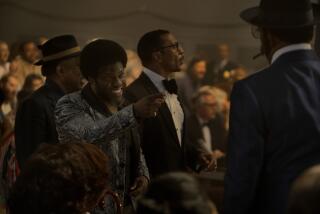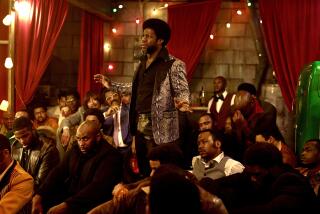An emasculated man battles back in ‘Fight Song’
Fight Song
A Novel
Joshua Mohr
Soft Skull Press: 272 pp., $15.95
The San Francisco writer Joshua Mohr’s fourth novel, “Fight Song,” is a book about that weak and blubbering American species known as Emasculated Man. The novel’s protagonist is the symbolically named Bob Coffen. He’s a designer of computer games who isn’t quite dead — but whose manhood is definitely on life support.
As the novel opens Bob is getting one of those corporate work trophies that’s supposed to be a boss’ thank you for loyalty but ends up making the underling who gets it feel pathetic — it’s a “plock,” a plaque with a clock that doesn’t actually keep time.
Bob is carrying the useless, weighty plock in his backpack on the bike ride home through an unnamed suburb when he has the first of a series of encounters that turn his life around: He gets run off the road by a neighborhood bully. Finally he realizes he’s been enduring a life where the people around him “mock Bob like it’s nobody’s business.”
The new Bob resolves to throw common sense and pragmatism out the window, because, “What have these things brought him besides boredom, mediocrity?” A series of bizarre adventures follows, involving a sexy dispenser of “Mexican lasagna,” the philosophizing members of a Kiss tribute band and a marriage-counselor-cum-sorcerer.
“Fight Song” is a novel that shares qualities with the conflicted dad whose story it tells. It’s a work that’s uneven and slapdash in parts and seemingly uncertain what it wants to be. But it manages to be funny and endearing in the end.
Mohr begins with obvious satirical intent and has a wonderful eye for the details of manly humiliation. Bob’s wife has him riding a bike to work to lose weight, but when he gets to work he goes to the office bathroom and “wildly paper-towels away the pond of sweat from his crack.”
But for every precise and cutting observation in “Fight Song” there is also a moment of broad and not especially deep humor. There’s a “scourge of a mother-in-law” who’s a predictably irritating foil. And when one of Bob’s new friends commits a crime and makes him an accomplice, Bob responds with the kind of joke about jail and sodomy you’ve heard a thousand times before.
Eventually, however, it becomes clear that satire might not be all that the book is after.
In his quest to win back the affections of his wife, Bob meets a janitor, Ace, who is also the guitarist in a Kiss tribute band. Ace doesn’t have much, but he’s in love with a beautiful woman. Ace is at once down-to-earth and articulate, and he charms Bob with his down-market earnestness.
“Dude … this is an oddball world. Look around you, look outside, it’s only getting weirder,” Ace says. “I firmly believe that we should all boogie to our own beat.... Make a world that’s going to make us happy. I’m making up mine.”
Not many authors can shift from satire to sentiment so easily, but Mohr is a clever enough writer that he manages to pull this off. His ear for comic dialogue rescues his scenes and lifts up his novel again and again.
As the plot in “Fight Song” becomes increasingly surreal, it gets funnier, and the emotional veins it taps into grow more real and textured. The novel becomes a kind of parable, a story of man searching for redemption.
“He has to fight,” Bob Coffen tells himself. “There’s still time. But how?” In “Fight Song,” Mohr’s answer to this question is clear. A real man fights back with a sense of humor and a sense of wonder.
More to Read
Sign up for our Book Club newsletter
Get the latest news, events and more from the Los Angeles Times Book Club, and help us get L.A. reading and talking.
You may occasionally receive promotional content from the Los Angeles Times.








